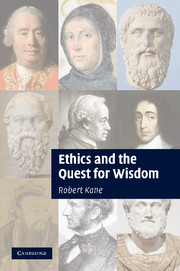Book contents
- Frontmatter
- Contents
- Acknowledgements
- 1 Introduction: pluralism and uncertainty
- 2 Openness
- 3 The retreat
- 4 The moral sphere
- 5 Fact and value
- 6 Value experiments
- 7 Virtues, excellences and forms of life
- 8 The fourth dimension
- 9 Aspiration
- 10 Wisdom
- 11 Objective worth
- 12 The Bach crystals
- 13 Human flourishing
- 14 The Faust legend and the mosaic
- 15 The good and the right (I): intuitionism, Kantianism
- 16 The good and the right (II): utilitarianism, consequentialism
- 17 The good and the right (III): contractualism
- 18 Politics, public morality and law: justice, care and virtue
- References
- Index
10 - Wisdom
Published online by Cambridge University Press: 07 September 2010
- Frontmatter
- Contents
- Acknowledgements
- 1 Introduction: pluralism and uncertainty
- 2 Openness
- 3 The retreat
- 4 The moral sphere
- 5 Fact and value
- 6 Value experiments
- 7 Virtues, excellences and forms of life
- 8 The fourth dimension
- 9 Aspiration
- 10 Wisdom
- 11 Objective worth
- 12 The Bach crystals
- 13 Human flourishing
- 14 The Faust legend and the mosaic
- 15 The good and the right (I): intuitionism, Kantianism
- 16 The good and the right (II): utilitarianism, consequentialism
- 17 The good and the right (III): contractualism
- 18 Politics, public morality and law: justice, care and virtue
- References
- Index
Summary
FIRST PHILOSOPHY: ARISTOTLE
We turn now to the object of the aspiration that inspires the retreatants to try openness, which was said to be “wisdom in an ancient philosophical sense.” On this topic, it is useful to get our bearings once again from Aristotle. Ancient commentators placed after Aristotle's treatise on physics a collection of writings that dealt with the deepest philosophical issues about reality that went beyond physics and other sciences. These collected writings consequently came to be known as the “Metaphysics.” But Aristotle's own name for their subject matter was simply “wisdom” (sophia) or “first philosophy” (prote philosophia); and it was the love of this wisdom that gave philosophy its name.
“Wisdom” or “first philosophy,” as Aristotle described it, seeks true and comprehensive answers to the questions “what is?” and “why?” It seeks to know the way things really are in the most comprehensive sense (“what is”). But more than that, wisdom or first philosophy seeks to know “why” things are as they are (their causes or first principles) and why it is reasonable to believe or accept any answers that may be offered about the nature of things. In this respect, as Aristotle points out, the lover of wisdom – the philosophos (whether scientist or philosopher, he made no distinction) – is more demanding than the lover of myth – the philomythos – though they are kindred spirits.
- Type
- Chapter
- Information
- Ethics and the Quest for Wisdom , pp. 119 - 128Publisher: Cambridge University PressPrint publication year: 2010



